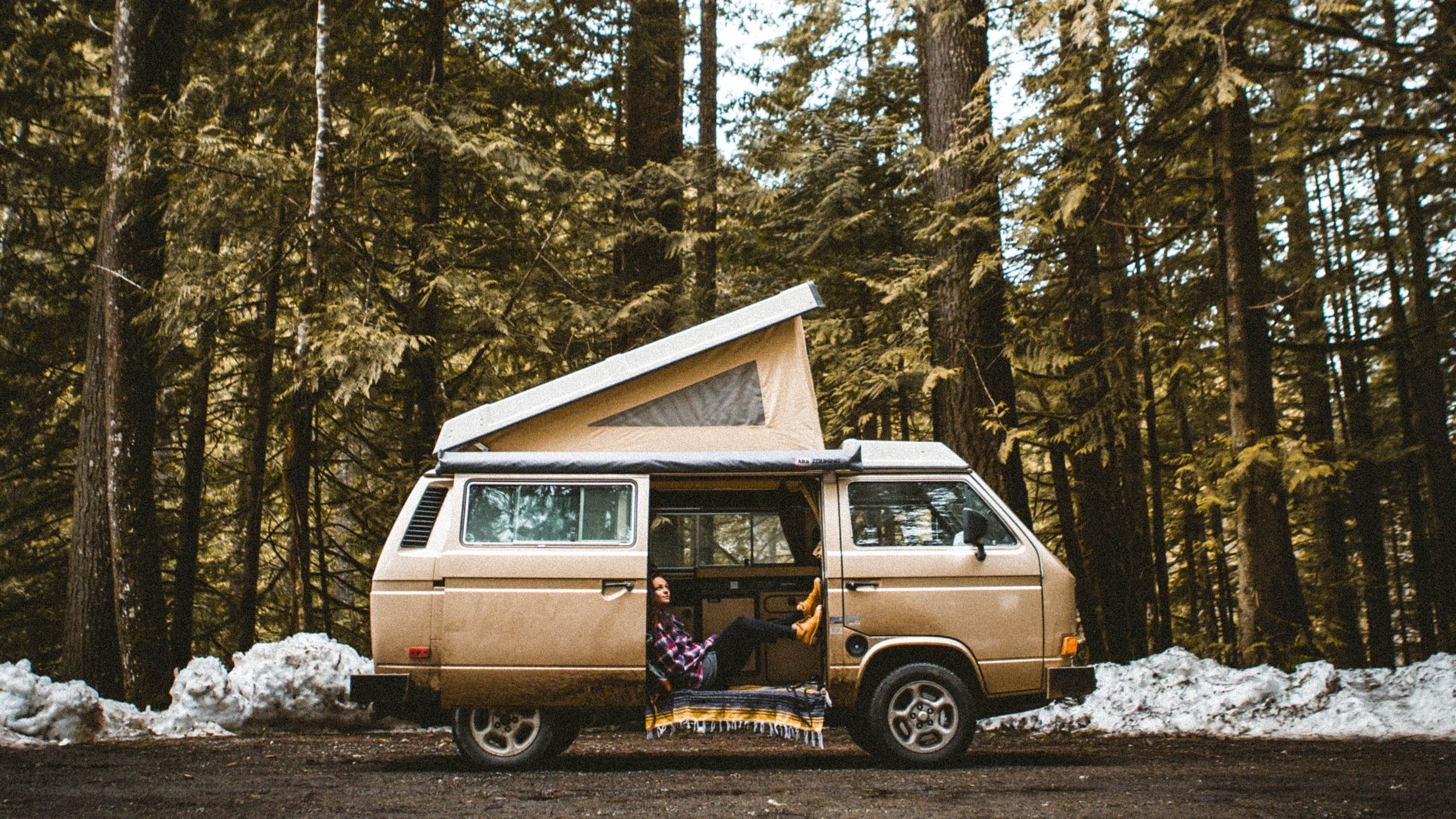WINTERIZING YOUR CAMPER VAN
Winter is nigh, and with it, comes the arrival of cooler temps and wetter conditions. Much of the country will see the mercury drop and precipitation rise. To prepare you for the change in seasons, we’ve put together a checklist of recommendations to winterize your camper van.
Whether you plan to spend the winter adventuring around or you prefer to put your van into hibernation until spring, follow these tips to ensure you get through these next several months smiling.
Hitting the Road in Your Camper Van this Winter
Winter camping can offer the peace, serenity and solitude that crowded summer months aren’t able to provide. Here are a few procedures to take into account to make the season even more enjoyable.
Run the AC/Defrost
If you’re driving a more modern camper van with AC/defrost, turn it on. It will help suck the moisture out of the van. For vintage VW camper vans, we recommend keeping two tubs of DampRid (made of calcium chloride) in the vehicle to help draw moisture out.
Brush off your awning
If there’s frost or snow in the morning, it can be very challenging to roll up your awning. Don’t force it or you’ll risk damaging the awning! Instead, when you’re packing up camp, simply brush off any ice or snow that’s built up overnight. The plastic-like material doesn’t hold any liquid, so a de-ice or defrost solution won’t work. But a little elbow grease and a brush (think of the brush on the windshield scraper) will do the trick.
Upgrade your tires
All-weather or winter tires will make a huge difference on icy or snow-plowed roads. You can upgrade your tires when you purchase a camper van from us or swap out your tires as the winter season approaches. During the camper van conversion process, we do add a significant amount of weight to the back of the vehicle, which helps stabilize the rear-wheel drive vans in winter conditions.
Carry chains
If you’re driving over mountain passes where icy or snowy conditions exist, it’s always a good idea to have chains on hand—and often it’s required for safety. While our camper vans aren’t ideal for heavy snow, high clearance, or 4-wheel drive roads, they perform really well on plowed roads. Chains add that extra traction and peace of mind.
Keep an Emergency Kit on hand
As we transition to cooler temps and wetter conditions, make sure your van is equipped with an emergency kit. Check out this list of several items we recommend keeping on hand in case things happen to go awry.
Run a dehumidifier
This one’s a biggie for those living in the Pacific Northwest and other climates that see a lot of rain in the winter—it’s something we highly recommend whether you’re winter camping or hibernating your vehicle. Running a dehumidifier overnight a couple times a month will help keep seats and upholstery dry and mold-free.
Keep your camper van well ventilated
Even with winter camping, we still recommend having some sort of outside air flow. At night, even if you have a heater running, crack a window to help move moisture out of the van while you're sleeping; that’s when it has a tendency to build up. You’ll avoid waking up to damp seats and foggy windows in the morning.
Dry out YOUR van after each camping trip
With rain and snowy weather, you’re going to want to be extra diligent about drying everything out. After you get home from your trip, pop up the top, pull out the awning, and let things air out for a day or two.
Preparing Your Camper Van for Winter Hibernation
There’s no shame in being a fair weather camper. If you plan to put the keys up during the winter months, it’s important to prep your vehicle for winter hibernation. That way, when the weather warms back up, your camper van will be in prime shape for adventures again.
Give YOUR camper van a thorough deep cleaning
To avoid rodents and pests getting comfortable in your camper van, make sure you empty and clean out the fridge. We know mice and other critters are attracted to food odors. Use an all-purpose cleaner to scrub the fridge, counters, cabinets, and floor—and make sure there’s absolutely no scraps or residue left behind to entice them.
Empty Your Water System
Remove all of the water from your water system before your camper van’s winter nap. Keep the water line as dry as possible by opening up the tank. Exposing it to circulating air will provide ventilation and prevent mold and mildew from building up.
Clean your awning
While it’s important to make sure the inside of your camper van is clean, it’s also crucial to give the outside of the vehicle some extra attention. Your awning is a key part of this. Give it a good cleaning and make sure there's no leaves stuck up in there; the tannins in decomposing leaves will stain the awning.
Take care of your pop top
Throughout the year, pollens and other contaminants build up and may cause the pop top to stick as you try to open it, loosening the sealant in the process. We recommend completely wiping off the pop top seal 1-2 times a year to keep it functioning properly.
Keep your battery charged
Winter weather is hard on batteries, zapping the life from them and rendering them useless. Keep your camper van battery plugged in as much as possible when it’s not in use. If those auxiliary batteries sit in chilly temps for long periods, it can easily damage them. A charged battery is a happy battery!
Questions about winterizing your camper van?
Don’t hesitate to reach out and contact us at SERVICE@PEACEVANS.COM.






